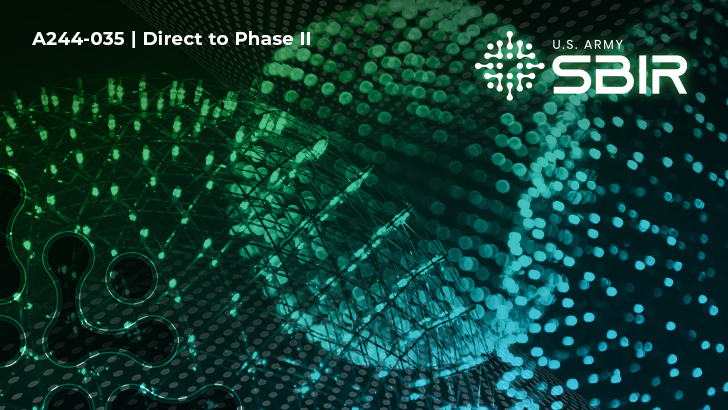

Selectees
Objective
This Army SBIR solicitation is for artificial intelligence and machine learning-driven methodologies that can control the production processes for Nano-Nitramines. The Army seeks to produce the most efficient, effective formulations currently known in an agile and flexible manner. AI/ML-driven manufacturing and formulation science can apply “cradle to grave” for Nano-Nitramines, and can enable their widespread adoption by making research and production automated.
Description
The Army currently produces coarse nitramines (HMX, RDX, and CL-20) in enormous quantities and Nano-Nitramine in experimental batches. Significant delays occurred in transitioning Nano-Nitramine because manufacturing is especially time consuming. Furthermore, once produced, they are difficult to process. This is partly caused by the difficulty in producing and manipulating Nano-Nitramines and the low supply of CL-20 of any particle size.
We believe that AI/ML technologies will improve processes to produce coarse and nano-nitramines. The Army currently uses techniques to measure several critical parameters for the manufacturing of energetic materials. However, it cannot use the data effectively. We believe that AI/ML-controlled crystallization and manufacturing of nitramines will provide the following improvements:
Phase I
This topic will only accept Direct to Phase II proposals for contracts worth up to $2,000,000 over a 24-month performance period. https://armysbir.army.mil/phase/
Proposers interested in submitting a DP2 proposal must provide documentation to substantiate that the technology meets the scientific, technical merit and feasibility equivalent to a Phase I project. Documentation can include data, reports, specific measurements and the success criteria of a prototype.
Phase II
Firms will demonstrate the feasibility of the proposed techniques to monitor and control coarse nanomaterials during manufacturing. Vendors must implement the probes during the manufacturing process and collect data, and should then use the data with machine learning algorithms.
Phase III
Submission Information
All eligible businesses must submit proposals by noon, ET.
To view the full solicitation details, click here.
For more information, and to submit your full proposal package, visit the DSIP Portal.
Applied SBIR Help Desk: usarmy.pentagon.hqda-asa-alt.mbx.army-applied-sbir-program@army.mil

References:
Selectees
Objective
This Army SBIR solicitation is for artificial intelligence and machine learning-driven methodologies that can control the production processes for Nano-Nitramines. The Army seeks to produce the most efficient, effective formulations currently known in an agile and flexible manner. AI/ML-driven manufacturing and formulation science can apply “cradle to grave” for Nano-Nitramines, and can enable their widespread adoption by making research and production automated.
Description
The Army currently produces coarse nitramines (HMX, RDX, and CL-20) in enormous quantities and Nano-Nitramine in experimental batches. Significant delays occurred in transitioning Nano-Nitramine because manufacturing is especially time consuming. Furthermore, once produced, they are difficult to process. This is partly caused by the difficulty in producing and manipulating Nano-Nitramines and the low supply of CL-20 of any particle size.
We believe that AI/ML technologies will improve processes to produce coarse and nano-nitramines. The Army currently uses techniques to measure several critical parameters for the manufacturing of energetic materials. However, it cannot use the data effectively. We believe that AI/ML-controlled crystallization and manufacturing of nitramines will provide the following improvements:
Phase I
This topic will only accept Direct to Phase II proposals for contracts worth up to $2,000,000 over a 24-month performance period. https://armysbir.army.mil/phase/
Proposers interested in submitting a DP2 proposal must provide documentation to substantiate that the technology meets the scientific, technical merit and feasibility equivalent to a Phase I project. Documentation can include data, reports, specific measurements and the success criteria of a prototype.
Phase II
Firms will demonstrate the feasibility of the proposed techniques to monitor and control coarse nanomaterials during manufacturing. Vendors must implement the probes during the manufacturing process and collect data, and should then use the data with machine learning algorithms.
Phase III
Submission Information
All eligible businesses must submit proposals by noon, ET.
To view the full solicitation details, click here.
For more information, and to submit your full proposal package, visit the DSIP Portal.
Applied SBIR Help Desk: usarmy.pentagon.hqda-asa-alt.mbx.army-applied-sbir-program@army.mil
References:
